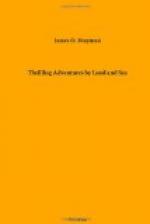For many weeks Susan nursed her charge, as tenderly as if it had been her sister. At first she lay almost motionless, and rarely spoke; then she grew delirious, and raved wildly. Susan fortunately could not understand what she said, but often turned shuddering away, when the Indian woman would strive to rise from her bed, and move her arms, as if drawing a bow; or yell wildly, and cower in terror beneath the clothes—reacting in her delirium the fearful scenes through which she had passed. By degrees reason returned; she gradually got better, but seemed restless and unhappy, and could not bear the sight of Nero. The first proof of returning reason she had shown, was a shriek of terror when he once accidentally followed his mistress into the room where she lay. One morning Susan missed her; she searched around the hut, but she was gone, without having taken farewell of her kind benefactress.
A few years after, Susan Cooper,—no longer “pretty Susan,” for time and grief had done their work—heard, late one night, a hurried knock, which was repeated several times before she could open the door, each time more loudly than before. She called to ask who it was at that late hour of night. A few hurried words in Iroquois was the reply, and Susan congratulated herself on having spoken before unbarring the door. But, on listening again, she distinctly heard the same voice say, “Quick—quick!” and recognized it as the Indian woman’s voice she had nursed. The door was instantly opened, when the squaw rushed into the hut, seized Susan by the arm, and made signs to her to come away. She was too much excited to remember then the few words of English she had picked up when living with the white woman. Expressing her meaning by gestures, with a clearness peculiar to the Indians, she dragged rather than led Susan from the hut. They had just reached the edge of the forest when the wild yells of the Indians sounded




